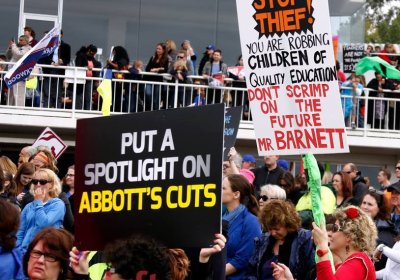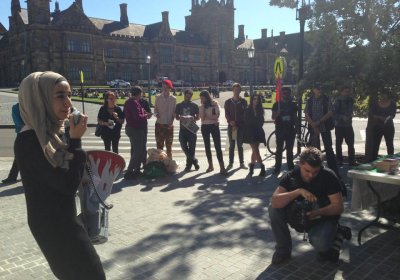Large stop-work rallies were held across Western Australia on September 19 to fight the Liberal state government’s education cuts.
About 15,000 people attended the rally in Perth and another 5000 attended stop-work meetings across regional WA, including 2000 in Bunbury, 500 in Albany, 520 in Pinjarra and 200 in Port Hedland.
Even small schools in the remote north-west of the state took part. A total of 62 schools were shut down for the morning.
Education
Thousands of striking teachers seized two of Mexico City's central thoroughfares on a march to the president's residence on September 11 after losing their battle to block new educational reforms less than 24 hours earlier.
The teachers disrupted the centre of the city for at least the 14th time in two months, decrying a plan designed to break union control of Mexico's education system and, they say, damage education in Mexico's poor south in the process.
The fight to defend public education is shaping up to be a key campaign against the cutback agenda of the Colin Barnett government in Western Australia. Thousands of teachers and education assistants rallied outside state parliament on September 3 in two separate mobilisations and further industrial action is planned.
The government claimed it has not cut education funding. However, the central issue is not about overall funding but the cuts to staffing levels. In August, the government announced they were planning to cut 500 education assistants and other support workers.
About 50 people joined a rally at Sydney University on August 28 to show solidarity with academics Jake Lynch and Stuart Rees, who have been threatened with legal action over their strong backing for the boycott, divestment and sanctions (BDS) campaign against apartheid Israel.
Lynch, Rees and the Centre for Peace and Conflict Studies (CPACS) at Sydney university are facing a legal suit by Shurat HaDin, an Israeli Law Centre.
Students across the country held protest rallies against the federal government’s proposed cuts to higher education on August 20.
The cuts were announced by former prime minister Julia Gillard, but have been supported by PM Kevin Rudd, his new education minister Kim Carr and the Liberal opposition. With bipartisan support, these cuts will not be defeated without a fightback.
Brilliant poet Bertolt Brecht once said: “The worst illiterate is the political illiterate, he doesn't hear, doesn't speak, nor participates in political events. He doesn't know the cost of life; the price of the bean, of the fish, of the rent, of the shoes and of the medicine, all depends on political decisions.
“The political illiterate is so stupid that he swells his chest saying he hates politics. The imbecile doesn't know that from his political ignorance is born the prostitute, the abandoned child and worst things of all, the bad politician."
Student protesters will take to the streets in all capital cities and some major regional centres on August 20. The protests will stand up against the planned cuts to tertiary education by the federal government. Earlier this year, the government announced $2.8 billion in cuts to higher education, via cuts to universities and student welfare services.
But the demands will go further than an end to cuts. “Education for all” is one of the demands of the protests. But is a free and accessible education even possible in the age of austerity politics?
It's election season once again. For the first time in three years, the government is allocating us all our piece of democracy. People in suits are frantically talking about the issues of the day, in the hope that they can win over enough of us to put them into parliament.
Two of the defining issues in this battle are refugees and education. In both cases, candidates line up one after the other to show they are able to make the tough decisions.
A forum at the University of Wollongong on August 1 called "Trouble in the Edufactory: The Sydney Uni Strike and the Struggle for the University" heard from Sydney university PhD student and casual academic staff member Mark Gawne.
Gawne, a graduate of the University of Wollongong, described this year's series of strikes at Sydney as the product of years of dissatisfaction among staff and students over increasing cutbacks.
The National Tertiary Education Union released this statement on July 16.
***
The release of Universities Australia’s report, University student finances in 2012, on July 15 clearly shows that students need much more support while they are studying at university, Jeannie Rea National President of the National Tertiary Education Union (NTEU) said today.
“It’s a national disgrace that almost one in five university students reports going without food and ends up graduating with an average debt of almost $38,000,” Rea said.
The National Union of Students (NUS) education conference was held at the University of Adelaide from July 10-12.
This year’s conference occurred in the context of the most serious attack on university funding in many years. In April, the federal government announced it was cutting $2.8 billion from higher education.
Students responded to these proposed cuts by holding protests in cities across the country on May 14, the biggest student protests in years.
This is part two of an interview Green Left Weekly journalist Linda Seaborn conducted with Dr Bob Boughton who helped initiate a Cuban supported literacy program in the NSW town of Wilcannia. Part one of this interview can be read here.
***
How did it the literacy campaign change the lives of the graduates?
- Previous page
- Page 41
- Next page










